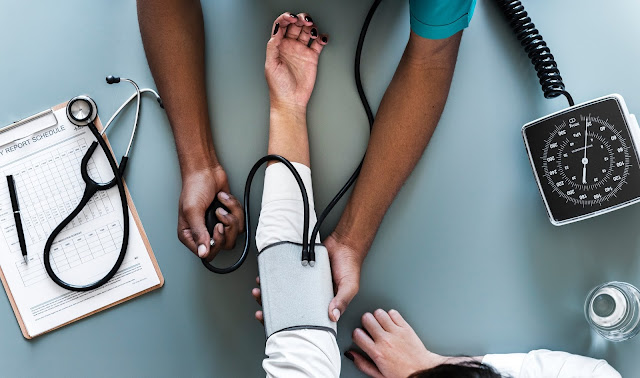In Honor of Rare Disease Day: My Diagnosis Story
I was 14 when I went to my pediatrician. I complained that knees had been getting red, hot to the touch, and swollen. I had also noticed that my feet had begun to turn purple when I stood up for too long. I also mentioned that I noticed rashes creeping across my stomach. My concerns were brushed off by the doctor, who reassured me that my body was going through a lot of changes. Even when I was found to have arthritis when I was seventeen, considered to be an "old person's disease." I was again told that it was nothing.
I had always been clumsy. I often said that I felt that my body didn't know where it was in space. I ran into walls, whacked other people in the face, and fell down the stairs on a regular basis. My handwriting was atrocious. No matter how many teachers tried to correct my grip my fingers seemed to flex all the wrong ways and smash up against my pencil. I was given correcting aids to put on my pencils and the school spent extra time with me, desperately trying to correct my handwriting. Eventually, they gave up. Forcing me instead to type everything on a typewriter. It was a strange practice to begin by eight, but by the time I began high school everyone else had caught up with me and not many people handed in written assignments anymore. My hand-eye coordination problems were chalked up to just a normal deviation. Everyone's handwriting is different. Mine was just much, much messier than normal. My doctor told me that my clumsiness was just a by-product of puberty. And, I was told I would grow out of it.
While most doctors brushed me off as going through normal changes, my mother suspected me of something more sinister. She suspected that I was malingering for attention. I was also extremely depressed, partially from the mistreatment I was experiencing from my mother. I was eventually hospitalized at an in-patient psychiatric hospital. When I expressed these concerns about my body and voiced the mistreatment I was experiencing at the hands of my mother, I was diagnosed with paranoid schizophrenia at the age of 15. While there are many complex feelings I have about this course of events in my life, I still feel angry. Females usually don't develop schizophrenia until adulthood, and I lacked many of the telltale symptoms of schizophrenia, I had no hallucinations or paranoid thoughts.
And, if I thought it was difficult to get doctors to take me seriously before, it was almost impossible after I received a diagnosis of paranoid schizophrenia. I was forced to take anti-psychotics while I was under my mother's roof, despite how many times I voiced my concerns over not really needing them. Unfortunately for me, many with schizophrenia are convinced that they do not need their medications. So, it was very, very easy for my concerns to be written off as a part of my disease. My weight skyrocketed. I was once 140 lbs and I quickly got to be 260lbs at my heaviest. I developed problems with my movement, language, and concentration. But, once I was 18, I was free to make my own choices. It took me until I was 20 to finally gain the courage to stop taking my medicine altogether. I didn't have my doctor's permission to stop taking my medicine, so I stopped taking it all at once. After that I began to quickly lose weight, losing 100lbs in less than a year.
I also noticed some new things about my body. My back hurt. It hurt so bad that when I stood up for too long I couldn't breathe. I got dizzy. My left leg began to feel very weak. My lips began to become numb and my speech began to slur. When I became stressed rashes began to develop across my arms and chest. I even began to develop hives across my neck and face. At one point, I even developed brown, crusty rashes across my hands and in between the webbings of my fingers. I lost sensation in my fingers and feet. My feet and fingertips began to tingle. The skin on my feet would burn and feel like fire ants were crawling across me. And, the muscles in my calves would cramp and feel like a charlie horse that would not go away. To top it off, I was experiencing stomach issues. I had severe persistent nausea every day, I would vomit and constipated to the point where I felt I couldn't get out of bed. Making matters worse, I had migraines every day that interfered with my vision. These headaches persisted for months and months.
I was hospitalized and a multitude of tests were run. All of them came back normal. Months passed with no answer. My neurologist suggested I start to see a psychiatrist and discharged me from his practice. My new psychiatrist suggested I had conversion disorder. Eventually, I began to accept this diagnosis.
Years passed. I was now 24. For three years I had been ill with no answer. I was forced to quit working. I had no treatment that worked for me. But, I did see a counselor and a physical therapist. I was miserable, but I believed that this was how my life was going to be for the remainder of my time here on Earth. Until my sister texted me and told me she had an appointment with a geneticist. She had developed an eye condition that was associated with a few different genetic disorders. After some testing, it was determined that she had Ehler-Danlos Syndrome (EDS), a group of inheritable connective tissue disorders. As her sister, I had a 50/50 chance of also having the syndrome.
I got a referral to a geneticist and I was told it would be about a six-month wait to see him. I debated if it was even worthwhile going. I knew this syndrome was incurable, and it didn't think there was any point in being diagnosed with something that I couldn't do anything to fix. But, I decided to wait it out and see the doctor. After running some tests, it became clear that I too had inherited Ehler-Danlos Syndrome. It was shocking to hear, but that's also when my life changed for the better.
I had now been off antipsychotics for about 4 years and almost all of the negative side effects had faded away. Like magic, doctors began to take me seriously after I was diagnosed with Ehler-Danlos Syndrome. When I mentioned I had nausea it was no longer "stress" it was "a function of my dysautonomic dysfunction" and a "damaged vagus nerve." Every single symptom I had could be attributed to EDS or one of its common comorbidities. I was prescribed medicine that helped. I was given physical therapy specifically tailored to help my syndrome based on the Muldowney protocol.
Overnight, I felt that my life long outlook had changed for the better. I now knew that I had a progressive condition. But, now I knew what to do. I had a name and I had a community of fellow patients who understood me.
But, I can't help wonder why did it take me so long to get a diagnosis? After talking to other people with EDS this is not uncommon. Sometimes people don't receive a diagnosis until they are 40 or 50. This is something we have lived with our whole lives, we are born with it, but it can take decades to receive a diagnosis. And, why was I accused of malingering for so long? I had an actual medical condition, but I was told it "was all in my head" or a "product of my mental illness." Even if I did have a mental illness, it doesn't mean that there is nothing physically wrong with me. The only solution I have found is to continue to bring awareness to rare conditions and mental health. Even if it was all in my head that doesn't mean it's less important than a physical illness. And, if I had a physical condition dismissing it as "only" a mental health condition can close off the appropriate diagnosis and treatment, potentially forever.
I wonder how many people are like me, searching for answers that never seem to quite exactly fit. Or maybe they are in a psychiatrist's office being treated for malingering disorder or anxiety, knowing that those diagnoses are not quite right. I feel sad when I think about all the people who have died while waiting for their answers. But, they are why I try and bring awareness and why I celebrate rare disease day.







Comments
Post a Comment